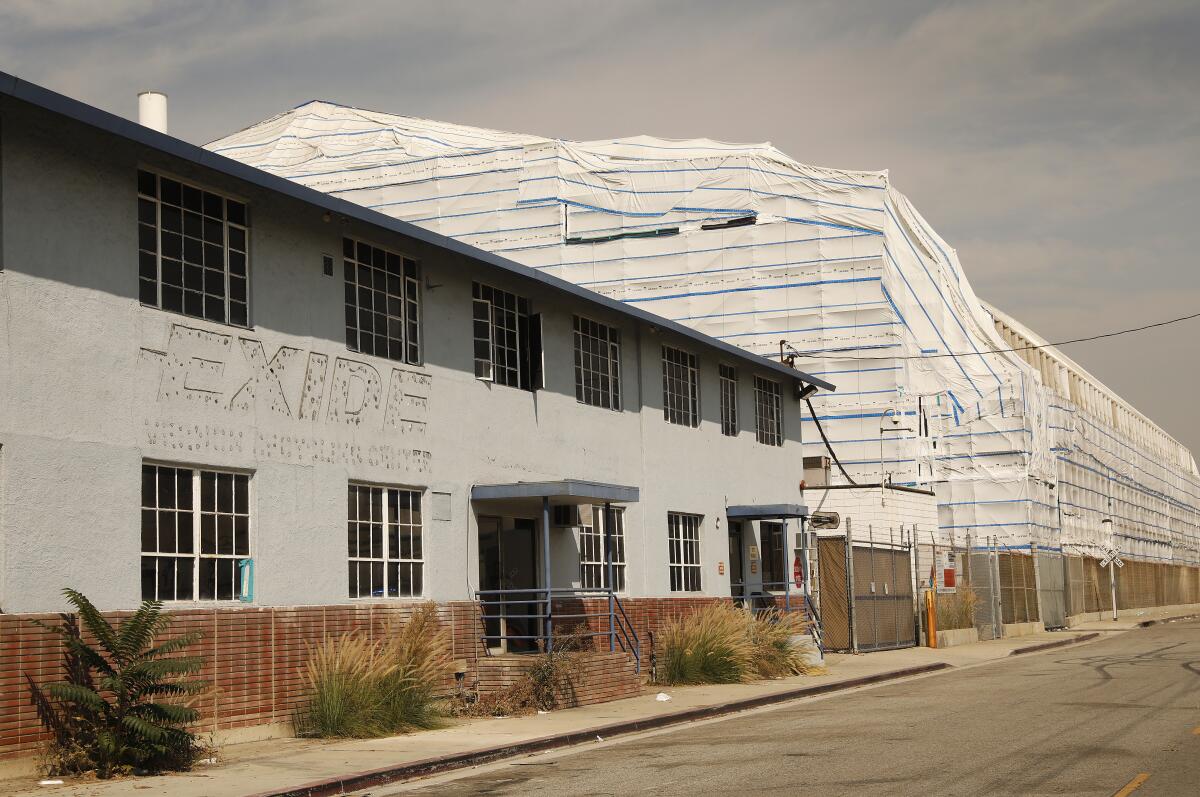Editorial: Don’t let Exide walk away from its toxic mess

- Share via
Five years ago, federal prosecutors made a devil’s bargain with one of Los Angeles’ worst polluters.
Authorities had built a damning case against Exide Technologies, which operated a battery recycling plant in Vernon. They found environmental violations spanning two decades. The company tainted the groundwater and polluted the soil on its site with lead, arsenic and other toxic metals. It shipped truckloads of crushed plastic that leaked battery acid and lead onto roads. Worse, initial tests revealed that Exide’s pollution spread to nearby homes, where regulators found such high levels of lead that parents were warned to keep their kids from playing in their yards.
The U.S. attorney’s office could have filed criminal charges against Exide. Instead, the company was allowed to avoid prosecution if it agreed to demolish the plant and clean up the property and surrounding neighborhood. Prosecutors reasoned that this agreement was the best way to hold Exide responsible for the staggering cost of the cleanup. Exide, already in bankruptcy proceedings, had threatened to liquidate the company and walk away from its environmental obligations.
Five years later, that’s exactly what’s happening. Exide filed for bankruptcy again this year, proposing a reorganization plan that would allow it to abandon the Vernon site. Only this time, the Trump administration’s Justice Department is willing to let Exide walk away from its toxic mess.
If Exide is allowed to abandon the plant, California will ultimately be left to take responsibility for the cleanup. That means demolishing the plant and making the site safe. It also means California will be on the hook for cleaning up thousands of homes contaminated by Exide’s toxic air emissions. The state has already put up $270 million to test and remove lead-laced soil from 3,200 residential properties. Another 4,700 homes have tested positive for lead. Activists have warned the cost of cleaning all the homes contaminated by Exide could top $1 billion.
Who’s going to pay for all that work? California leaders have always said they intended to sue Exide to recoup the cost of the cleanup. But once Exide’s bankruptcy plan is approved, that won’t be possible. Taxpayers will be left footing the bill. And since California is in a deep budget deficit, it will be even harder for the state to put up the money needed to rapidly clean properties and make homes safe. Families will continue to risk lead exposure at home. Even small amounts of lead can cause permanent brain damage in young children, leading to lifelong learning disabilities and behavioral problems.
This is an abysmal failure on all levels to protect public health and to hold polluters accountable.
The proposed settlement contends that there’s not a lot of money available from the sale of Exide’s assets to address the damage the company inflicted around the country. But rather than throwing up its hands, the Justice Department should have pushed for a deal that provided more protection for Exide’s victims.
It also should have been more open to public input. Despite the enormous ramifications of Exide abandoning its Vernon property, the Justice Department took comments on the proposed settlement for just eight business days. A judge could approve Exide’s plans next week. This rush to close the deal denies community members the opportunity to make their case for environmental justice from Exide.
But it would be too easy to lay Exide’s unscrupulous exit on the Trump administration alone.
The California Department of Toxic Substances Control, along with the state agencies responsible for protecting air and water quality, bear the greatest blame for the Exide debacle. They allowed Exide to operate with just a temporary permit and outdated air pollution controls for 30 years, despite repeated air-quality and hazardous-waste violations. Watchdog groups also argue that the state hasn’t required companies like Exide that handle hazardous waste to provide adequate financial assurances to clean up contaminated properties if they go under.
Another problem is that bankruptcy law makes it too easy for companies to abandon polluted properties and escape their responsibility to clean up contamination. Exide contends in court filings that it has fulfilled its clean-up obligations under the terms of a 2014 agreement with the state. The state, however, argues that Exide’s pollution fallout was far greater than initially expected and that the company has an obligation to finish the job.
The state is right on that point. It should be unacceptable to let a serial polluter walk away after the full extent of its toxicity becomes clear, leaving the community to suffer.
More to Read
A cure for the common opinion
Get thought-provoking perspectives with our weekly newsletter.
You may occasionally receive promotional content from the Los Angeles Times.










